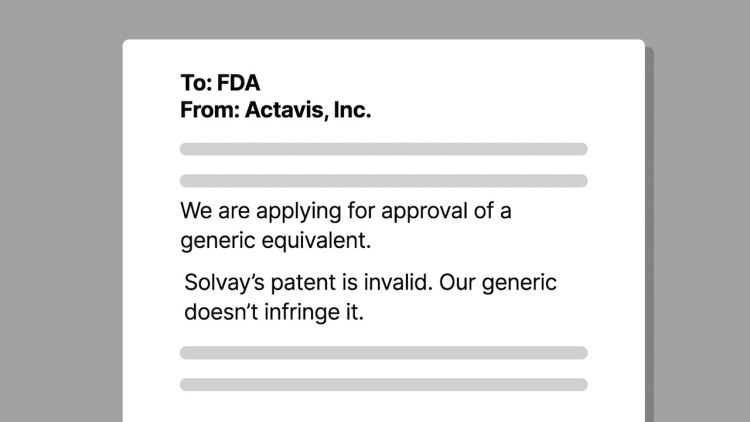Federal Trade Commission v. Actavis, Inc.
United States Supreme Court
570 U.S. 136, 133 S.Ct. 2223, 186 L.Ed.2d 343 (2013)
- Written by Samantha Arena, JD
Facts
In 1999, Solvay Pharmaceuticals (Solvay), a manufacturer of pharmaceutical drugs, filed an application for a new type of drug called AndroGel. The application was approved by the Food and Drug Administration in 2000, and Solvay obtained a patent for AndroGel in 2003. Later, Actavis, Inc. (defendant) filed an accelerated application for a generic drug based on AndroGel. In the application, Actavis alleged that Solvay’s patent for AndroGel was invalid and that Actavis’s generic drug did not infringe upon the AndroGel patent. Solvay brought a claim for patent infringement against Actavis to protect Solvay’s patent rights, but Solvay ultimately settled with Actavis and several other patent challengers after three years of litigation. Under the settlement agreement, Actavis was forbidden from bringing its generic drug to market until 2015, which was 65 months before the AndroGel patent expired. In exchange, Solvay agreed to pay Actavis $19,000,000 to $30,000,000 per year for the following nine years. The Federal Trade Commission (FTC) believed that the settlement agreement was intended to stifle competition and brought a lawsuit against Solvay and Actavis, alleging antitrust violations. The district court dismissed the case, holding that the FTC’s suit failed to claim a recognized antitrust violation. The court of appeals affirmed, holding that such settlement agreements were immune from antitrust liability, so long as any anticompetitive effects were within the exclusionary scope of the patent. The FTC appealed.
Rule of Law
Issue
Holding and Reasoning (Breyer, J.)
Dissent (Roberts, C.J.)
What to do next…
Here's why 907,000 law students have relied on our case briefs:
- Written by law professors and practitioners, not other law students. 47,100 briefs, keyed to 996 casebooks. Top-notch customer support.
- The right amount of information, includes the facts, issues, rule of law, holding and reasoning, and any concurrences and dissents.
- Access in your classes, works on your mobile and tablet. Massive library of related video lessons and high quality multiple-choice questions.
- Easy to use, uniform format for every case brief. Written in plain English, not in legalese. Our briefs summarize and simplify; they don’t just repeat the court’s language.





